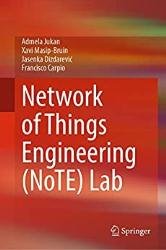Network of Things Engineering (NoTE) Lab
- Добавил: literator
- Дата: 23-04-2023, 05:55
- Комментариев: 0
 Название: Network of Things Engineering (NoTE) Lab
Название: Network of Things Engineering (NoTE) LabАвтор: Admela Jukan, Xavi Masip-Bruin, Jasenka Dizdarevic
Издательство: Springer
Год: 2023
Страниц: 213
Язык: английский
Формат: pdf
Размер: 10.2 MB
This book provides a hands-on experience in software and hardware engineering of IoT devices in edge and cloud computing systems, by putting in practice state-of-the-art concepts of hardware devices, networking and computing software. It proposes a Network of Things Engineering (NoTE) Lab, with seven hands-on lab modules covering topics ranging from “Interfacing sensors and actuators” and “Connecting IoT and Edge with MQTT" to “Data pipelining in cloud computing”. All tools and software used in the NoTE Lab are free and open source, and available to the readers. Specifically, Arduino-based boards that support a variety of low-cost sensors and actuators are used in IoT context. In edge computing, NoTE Lab implements off-the-shelf single board computers, Raspberry Pis with corresponding software and hardware. For cloud, well-known and widely used cloud computing open-source tools (e.g., Kubernetes) are deployed, where readers can learn the basics of monitoring and managing containers in cloud computing. Three communication protocols are used in the end-to-end setup, including MQTT, AMQP and HTTP. This lab book is a "must experiment with" for anybody in academia and industry participating in the fascinating IoT-edge-cloud continuum development.
Target Audience
This book is designed for undergraduate and graduate course levels in computer engineering and computer science. When preparing this book, we found that scoping the learning framework was most critically important to motivating the undergraduate students in particular. Many undergraduate students have little or no experience with typical IoT devices hardware or computer system software. We provide detailed and workable instructions about the hardware capabilities of IoT devices and the related easy-to-understand schematics on how to connect them without assumptions on specific prerequisites. We furthermore provide instructions that can help students learn how to use popular devices (such as Raspberry Pis) in combination with also popular cloud computing tools, thus creating an edge computing system. We provide instructions on a few basic computer network configurations, such as in local and wide area networks.
Graduate students can get familiar with a few communication protocols that co-exist in NoTE Lab individual lab modules, including MQTT (Message Queue Telemetry Transport), HTTP (HyperText Transfer Protocol), and AMQP (Advanced Message Queuing Protocol). The individual lab exercises are also defined with assignments for graduate students to stimulate and help acquire the engineering problem-solving skills in various domains. For instance, through lab module assignments, graduate students can experimentally study the performance of communication protocols in terms of delay. The lab assignments are optional for undergraduate students.
All students are expected to use both low- and high-level programming languages. For example, C++/Arduino is used on IoT devices and Python on Raspberry Pi. Overall, it is advantageous but not mandatory to acquire basic programming skills. For undergraduate students, this book provides all programming scripts and tools required in individual labs and tasks. This is also helpful to course instructors and tutors, so they do not have to dwell on system administration details. For graduate students, we define assignments that often require changing the existing scripts and configurations, thus stimulating their interest in developing their programming skills further. Finally, readers are introduced to a few open-source tools that are widely used in cloud computing today.
Скачать Network of Things Engineering (NoTE) Lab
[related-news] [/related-news]
Внимание
Уважаемый посетитель, Вы зашли на сайт как незарегистрированный пользователь.
Мы рекомендуем Вам зарегистрироваться либо войти на сайт под своим именем.
Уважаемый посетитель, Вы зашли на сайт как незарегистрированный пользователь.
Мы рекомендуем Вам зарегистрироваться либо войти на сайт под своим именем.
